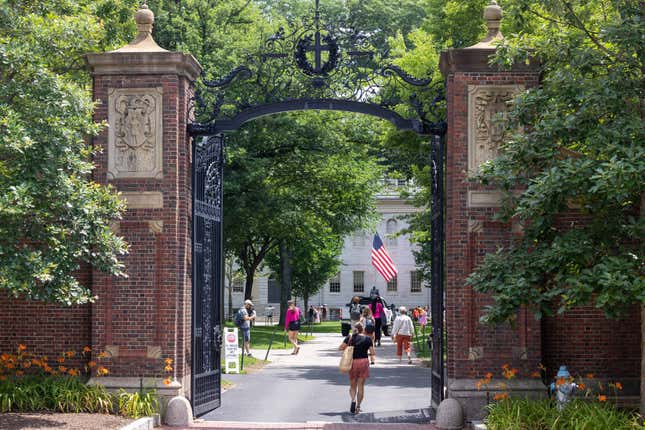
Harvard University has become the subject of a US Department of Education probe following a complaint from three civil rights organizations that allege the Ivy league institution discriminates on the basis of race by preferring candidates with alumni or donor connections.
The Office for Civil Rights (OCR), a sub-agency of the department, is investigating whether the university is in violation of Title VI, according to an Education Department letter (pdf) dated July 24. Title VI of the Civil Rights Act of 1964 prohibits programs or activities receiving federal funding from the Education Department to discriminate on the basis of race, color, or nationality.
The letter was written in response to a complaint filed by the Lawyers for Civil Rights in early July on behalf of The Chica Project, the African Community Economic Development of New England (ACEDONE), and the Greater Boston Latino Network (GBLN).
“Harvard College grants special preference in its admissions process to hundreds of mostly white students—not because of anything they have accomplished, but rather solely because of who their relatives are,” the complaint (pdf) reads. “The students who receive these special preferences are significantly more likely to be accepted than other applicants, and constitute up to 15% of Harvard’s admitted students.”
Nearly 70% of Harvard’s legacy and donor-related students are white, according to the complaint, and are also six or seven times more likely to be admitted compared to other applicants.
“Following the Supreme Court’s recent decision, we are in the process of reviewing aspects of our admissions policies,” a Harvard spokesperson said to Quartz in an email.
Wesleyan and University of Minnesota, Twin Cities have banned legacy admissions
Legacy and donor admissions, a common practice at US higher education institutions, have come under closer scrutiny since the Supreme Court struck down affirmative action in late June. With an end to race-based admissions, there is growing concern about how schools can still ensure diverse student bodies.
Some institutions have already taken action. Wesleyan University announced its decision to end legacy admissions on July 19, just weeks after the Supreme Court ruling. The University of Minnesota, Twin Cities also announced an end to the preferential policy in July.
“Legacy admissions were an unnecessary and unfair leg-up, that had nothing to do with merit, or someone’s experiences,” said Carter Yost, director of Twin Cities’ student government, to Minnesota news outlet MPR. “It’s a democratic society, and we try and avoid nepotism to the extent that we can.”
Amherst College, Johns Hopkins University, and the Massachusetts Institute of Technology had already dropped their legacy admissions policies prior to the Supreme Court decision.
Two Democrats, Senator Jeff Merkley and Representative Jamaal Bowman, spearheaded a legal effort to end legacy admissions in February 2022 via the Fair College Admissions for Students Act. The bill did not move past the Committee on Health, Education, Labor, and Pensions during the last Congressional session, but the lawmakers recently expressed their intentions to reintroduce the bill.
Related stories
😲 A new statistic reveals the startling privilege of white kids admitted to Harvard
✏️ Why MIT’s reinstating SAT requirements is good for African students
🙅♀️ The case against the college waitlist
The story was updated with a comment from a Harvard spokesperson.